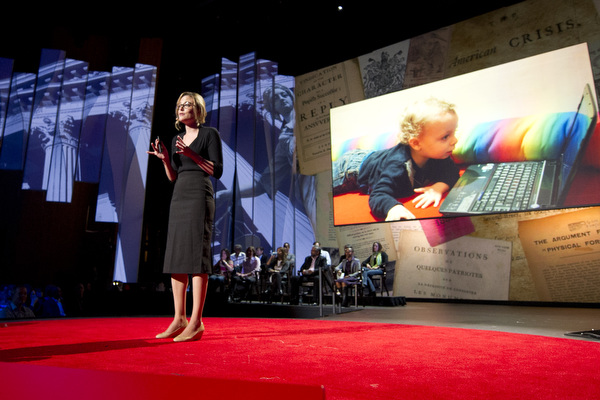Neuroscientist Tali Sharot comes on stage to discuss the “optimism bias.” It’s a topic that she’s been studying in her lab and she claims that 80% of us experience it. “It” being the tendency to overestimate the likelihood of good things happening to us. As she puts it: “we’re more optimistic than realistic, and we’re oblivious about it.” An example: Divorce rates in the western world weigh in at about 40%. Yet when you ask newlyweds to rate their own likelihood of divorce, they more than likely put the figure at, yes, 0%.
Similarly, many of us are uniquely biased toward the fabulousness of our own families. Sharot’s statistics show that three-quarters of people are optimistic about the future of their own families; yet only 30% said families are doing any better than they were a few generations ago. In other words, “We’re not so optimistic about the guy sitting next to us.”
So the real question here: is the widespread optimism bias good for us? Some say no, believing that low expectations mean we won’t be disappointed when things don’t work out — and yet pleasantly surprised if they do. This, says Sharot, “is a good theory that’s wrong for three reasons”:
1. Interpretation matters: Whatever happens, whether you succeed or fail, people with high expectations always feel better. That’s why optimists who get a poor result in an exam will blame the exam; they’ll nail it next time. Pessimists who get a good result in an exam will consider it a one-off.
2. Anticipation makes us happy: The thrill of the wait matters. That’s why people tend to prefer Friday to Sunday. On Friday we’re looking forward to the weekend ahead; on Sunday, the only thing to look forward to is the work week.
3. Optimism changes (objective) reality: It is not only related to success, it leads to it. If you expect to do well, you will put more effort into making it so.
But there are also pitfalls to the optimism bias. Sharot shares an email from a fire team captain who told her that fire teams often make mistakes even when all the necessary information is there to make safe decisions. The British government acknowledged the optimism bias can make individuals more likely to underestimate the cost and duration of projects — and so they adjusted the 2012 budget for the Olympic Games.
The key, she concludes, is to learn how to protect ourselves from dangers of optimism while also benefiting from its fruits. And the first step is to understand that the bias exists. Once we take that on board, we can work towards striking a balance and protecting ourselves from unrealistic optimism while remaining hopeful.

Comments (5)
Pingback: Data Doesn't Lie, Part I: Clinical Trials Enrollment Forecasting—Is It Worth It?
Pingback: Shiver With … | Tony's Texts
Pingback: Seeking Compromise, Part Two: Flying Penguins and Critical Optimism « Dysatisfunctional.com